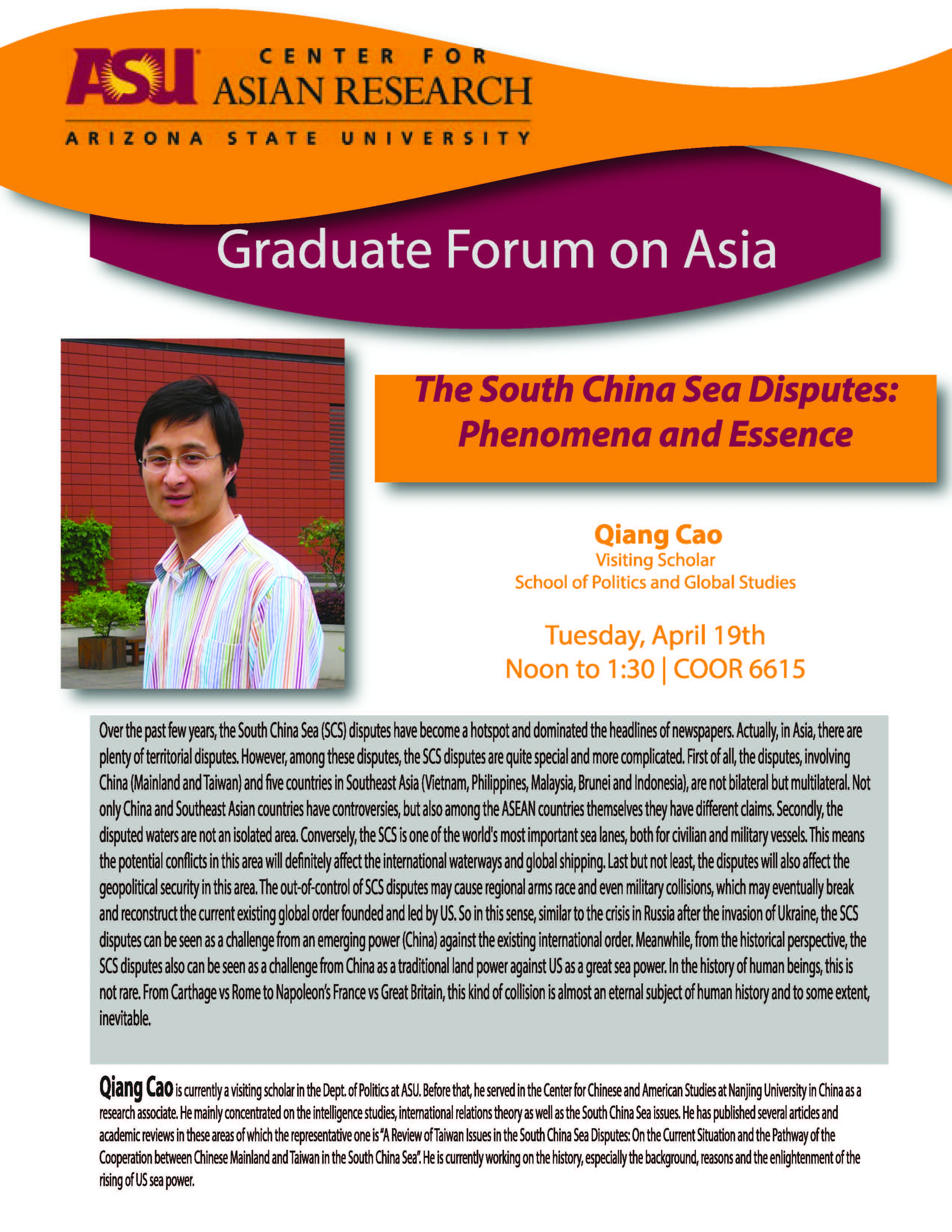Spring 2019
Please join us for a series of lectures by our Faculty members and STEELE Grant Recipients. The lectures will be held in COOR 6615 with topics ranging from Buddhist Monumentality to Communication in South Korea. Lunch will be provided to those who RSVP at least a week before each lecture that they wish to attend. For more information, please see the attached flyer or contact us directly at [email protected].
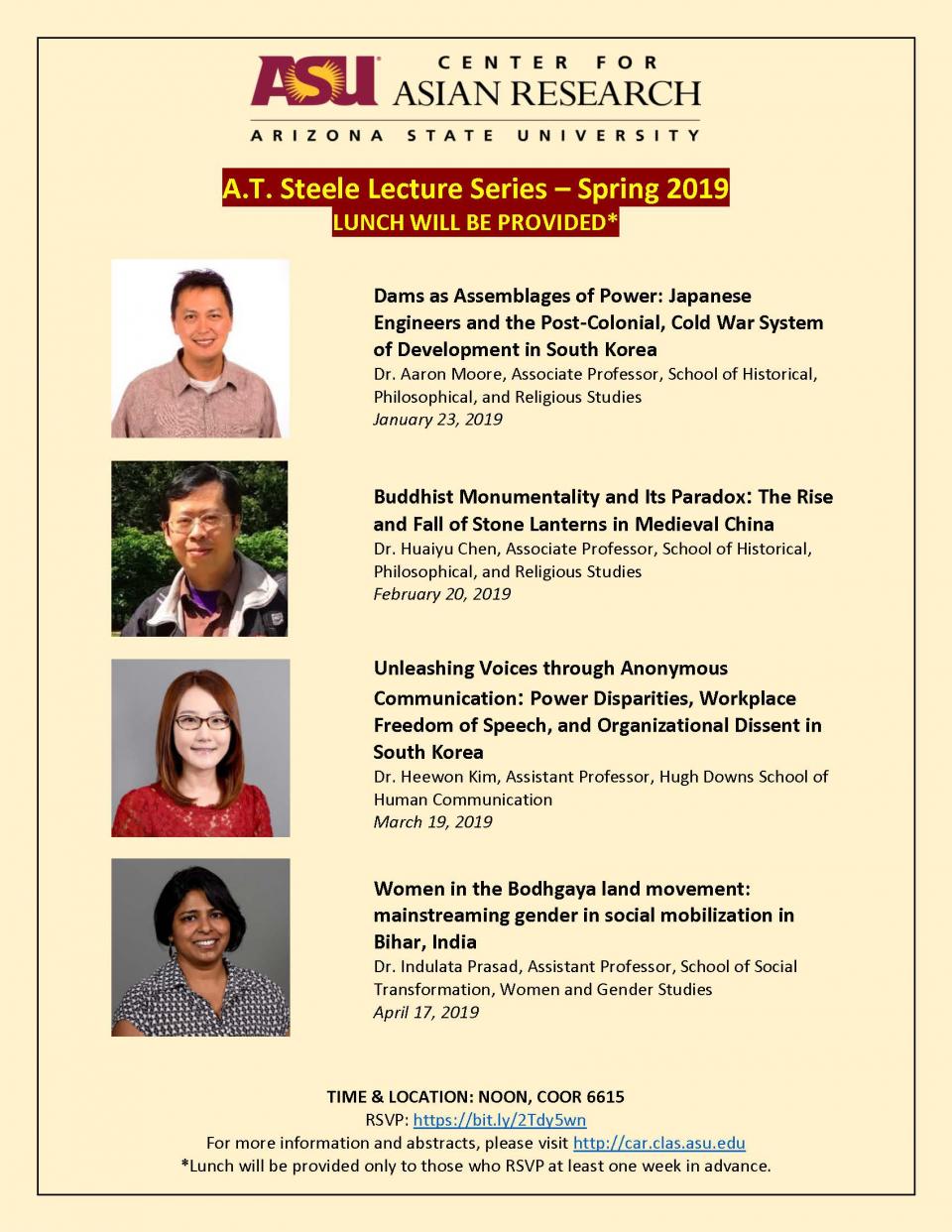
Spring 2018
The Trinity of Migration Conflicts
by Binod Khadria, Professor & Chair of Contemporary Indian Studies, Rutgers University
January 10, 2018
The talk focused on increasing international migrations of labor and how suc phenomena affect immigration and border controls of destination countries.
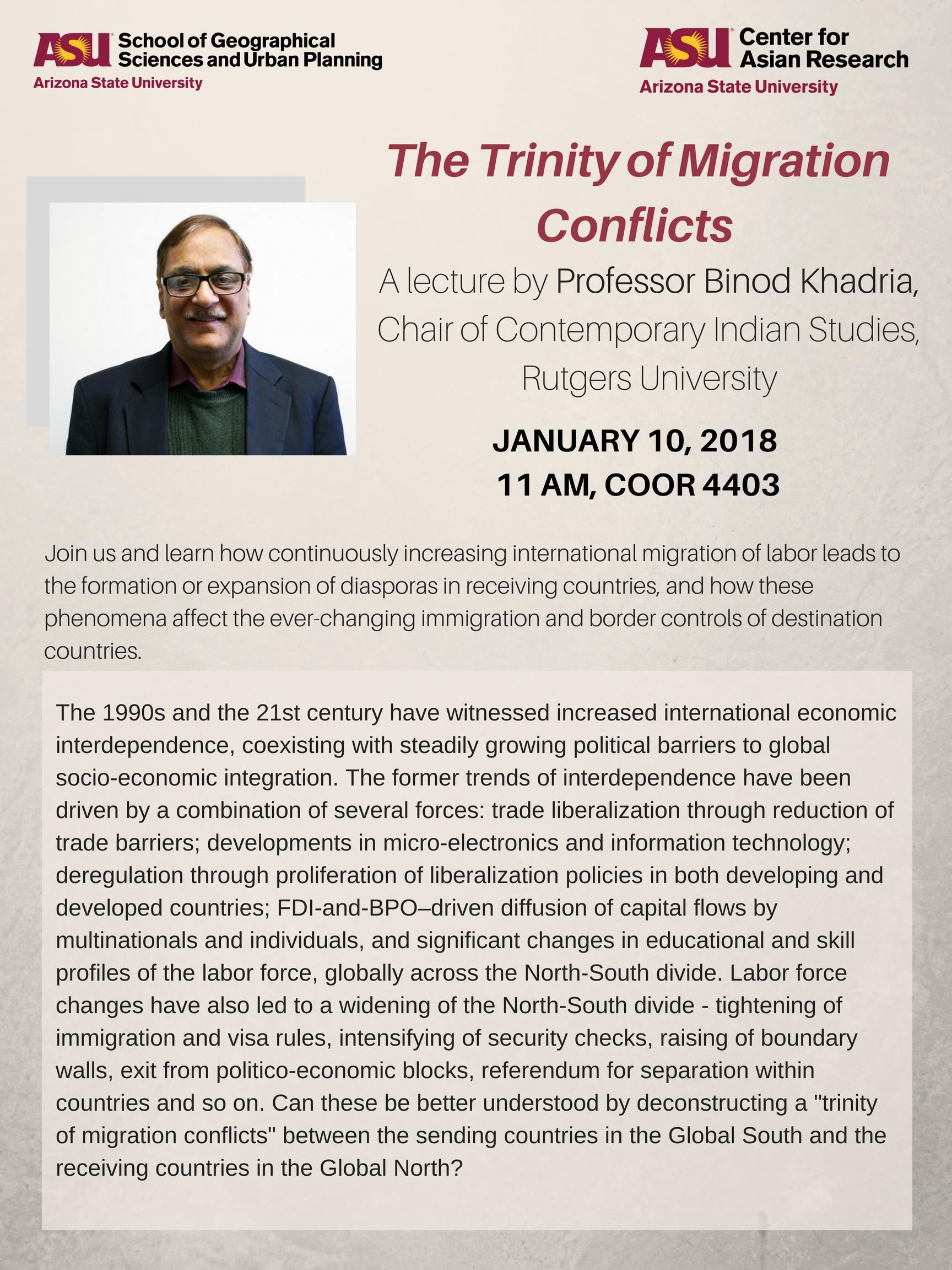
The Politics of Concern: Global Maoism and Asian Studies in the Long Sixties
by Fabio Lanza, Professor of History, University of Arizona
February 8, 2018
Fabio Lanza, a professor of history at the University of Arizona, visited ASU in February 2018 and delivered a talk based on his new book, The Politics of Concern: Maoist China, Activism & Asian Studies Attendees included scholars from different disciplines across ASU, including history, political science and Asian studies. The talk focused on the influence that Maoist China imparted on activists and intellectuals around the globe, with a particular focus on the Committee of Concerend Asian Scholars, outlining how its members worked to merge their politics and activism with their scholarship.
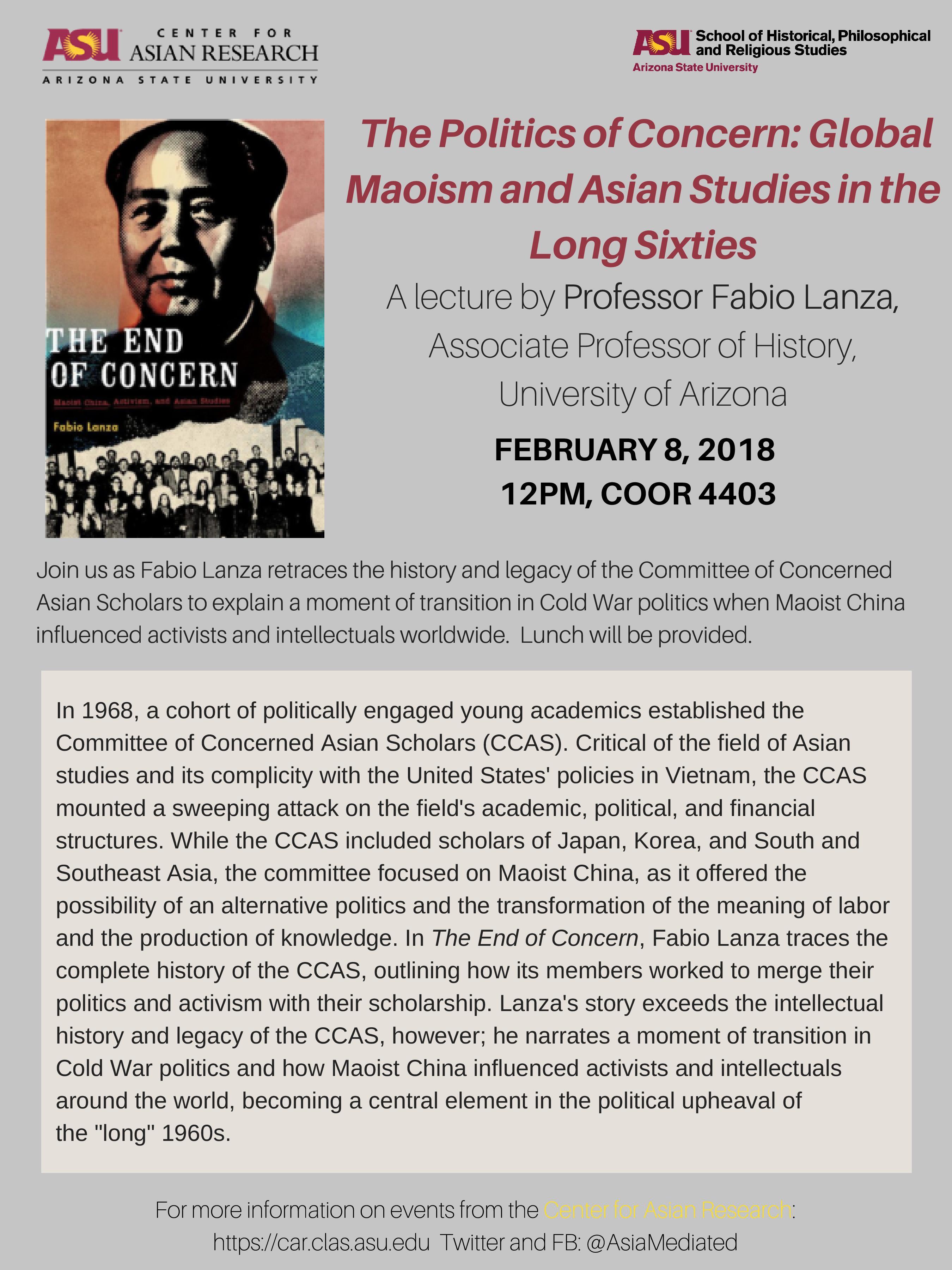
USIFL Asia Mediated Lecture Series
Extracting Affect: Televised Cadre Confessions in Contemporary China
by Christian Sorace, Assistant Professor, Colorado College
February 15, 2018
On February 15, Professor Christian Sorace of Colorado College delivered a talk based on a forthcoming article in the Journal of Public Culture, focused on the practice of televised confessions of corrupt Chinese Communist party cadres and its role in bolstering the image of the Party in contemporary China.
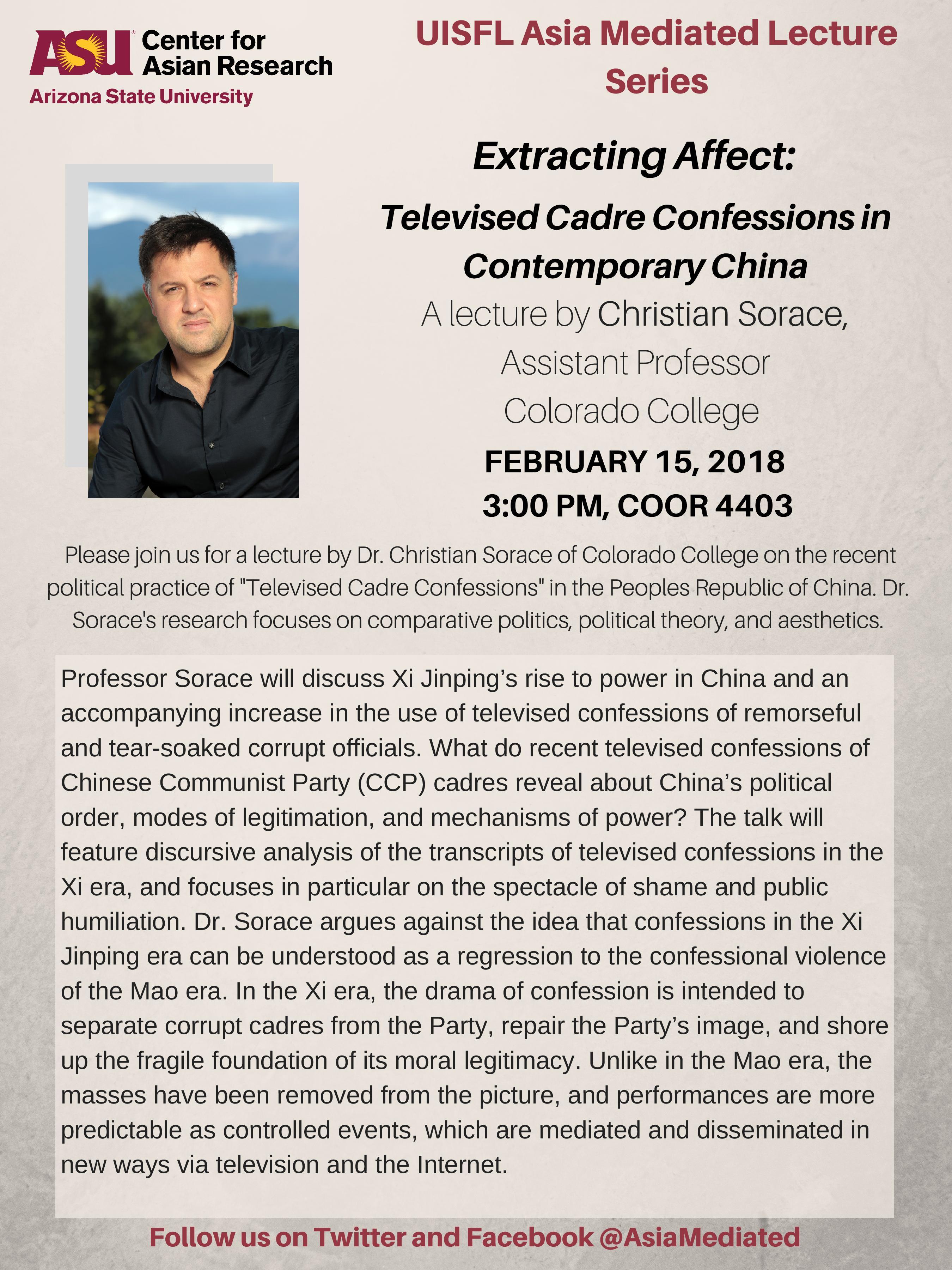
The South China Sea Conflicts: Is There A Solution?
by Sheldon Simon, Professor & Chair of the Political Science Department, ASU; and See Seng Tan, Professor of International Relations, Rajaratnam Institute of International Studies
March 1, 2018
ASU Professor Sheldon Simon and See Seng Tan, Professor at Singapore Rajaratnam Institute of International Studies (and an ASU alumnus of distinction) present a colloquium on the origins and possible solutions of the South China Sea Conflicts. This colloquium is sponsored by the ASU Center for Asian Research, School of Politics and Global Studies, and the Center for Law and Global Affairs in the Sandra Day O'Connor College of Law.
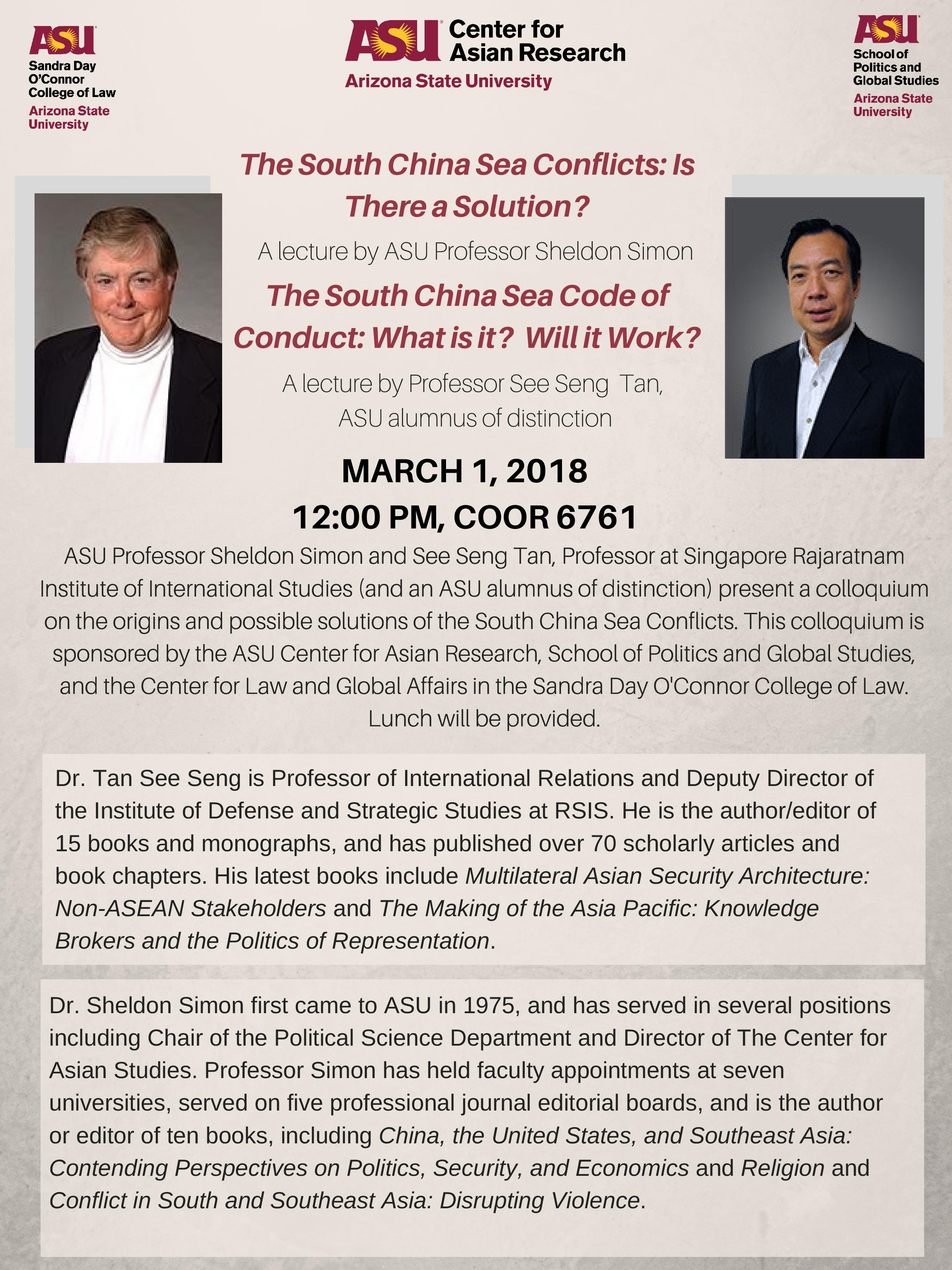
Fall 2017
USIFL Asia Mediate Lecture Series
A Sound Bridge: Listening for the Political in Digital South Asia
by Aswin Punathambekar, Associate Professor & Director, Global Media Studies Initiative, Department of Communication Studies, University of Michigan
October 19, 2017
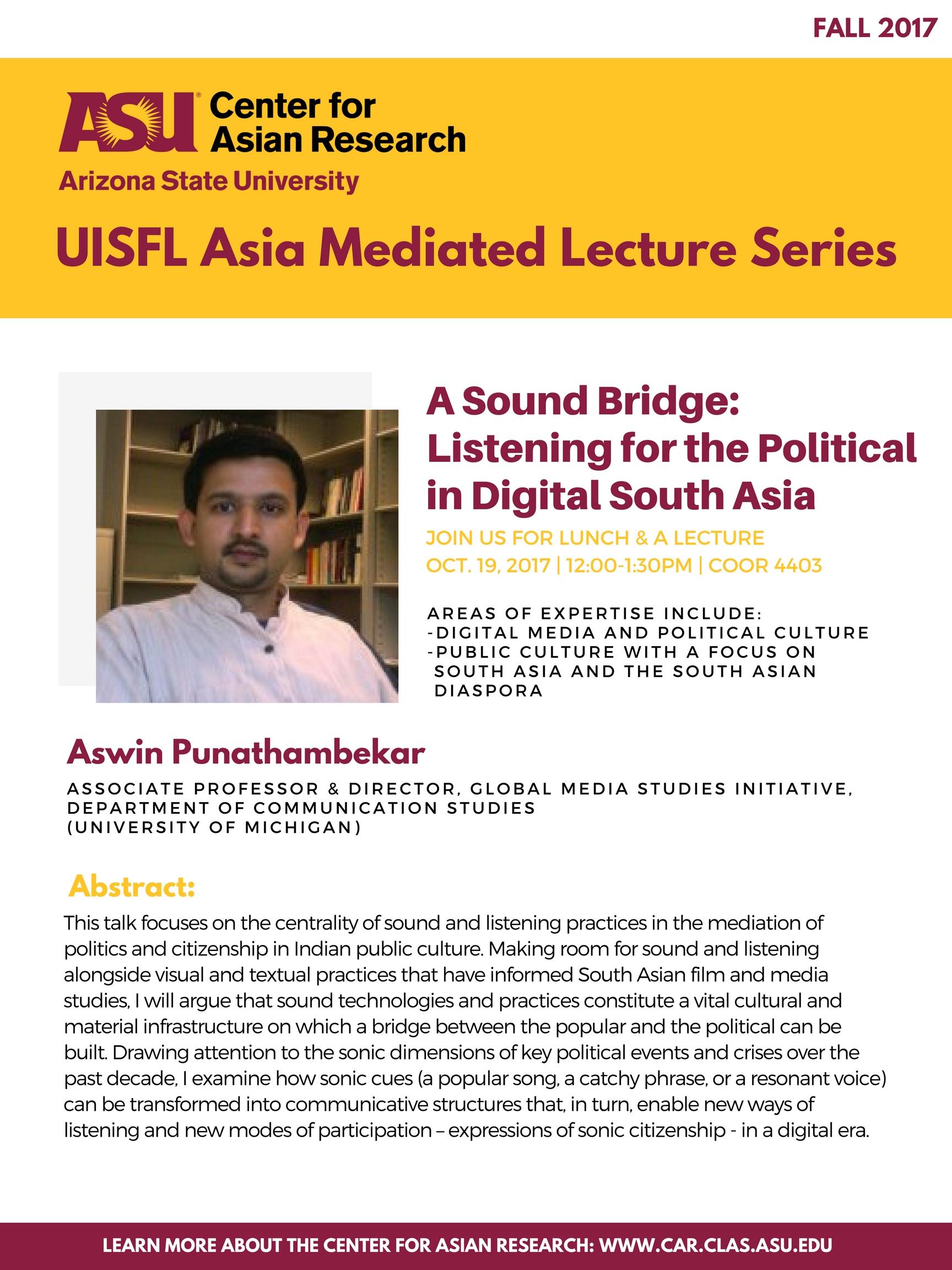
USIFL Asia Mediated Lecture Series
Speaking Truth to Power in the Era of Fake News & Propaganda
by Shiela Coronel, Professor, Dean of Academic Affairs & Director, Toni Stabile Center for Investigative Journalism, Columbia University
October 31, 2017
The news media in Southeast Asia, like elsewhere in the world, are being challenged by the dissemination online, especially on social media platforms, of fake news and propaganda. This comes at a time when the news media are facing problems on various fronts, including collapsing revenue models, pressure from media owners, and more draconian restrictions on the right to report and publish. This talk will examine the prospects for truth-telling in polarized and propaganda-rich media environments in Southeast Asia, particularly the Philippines.
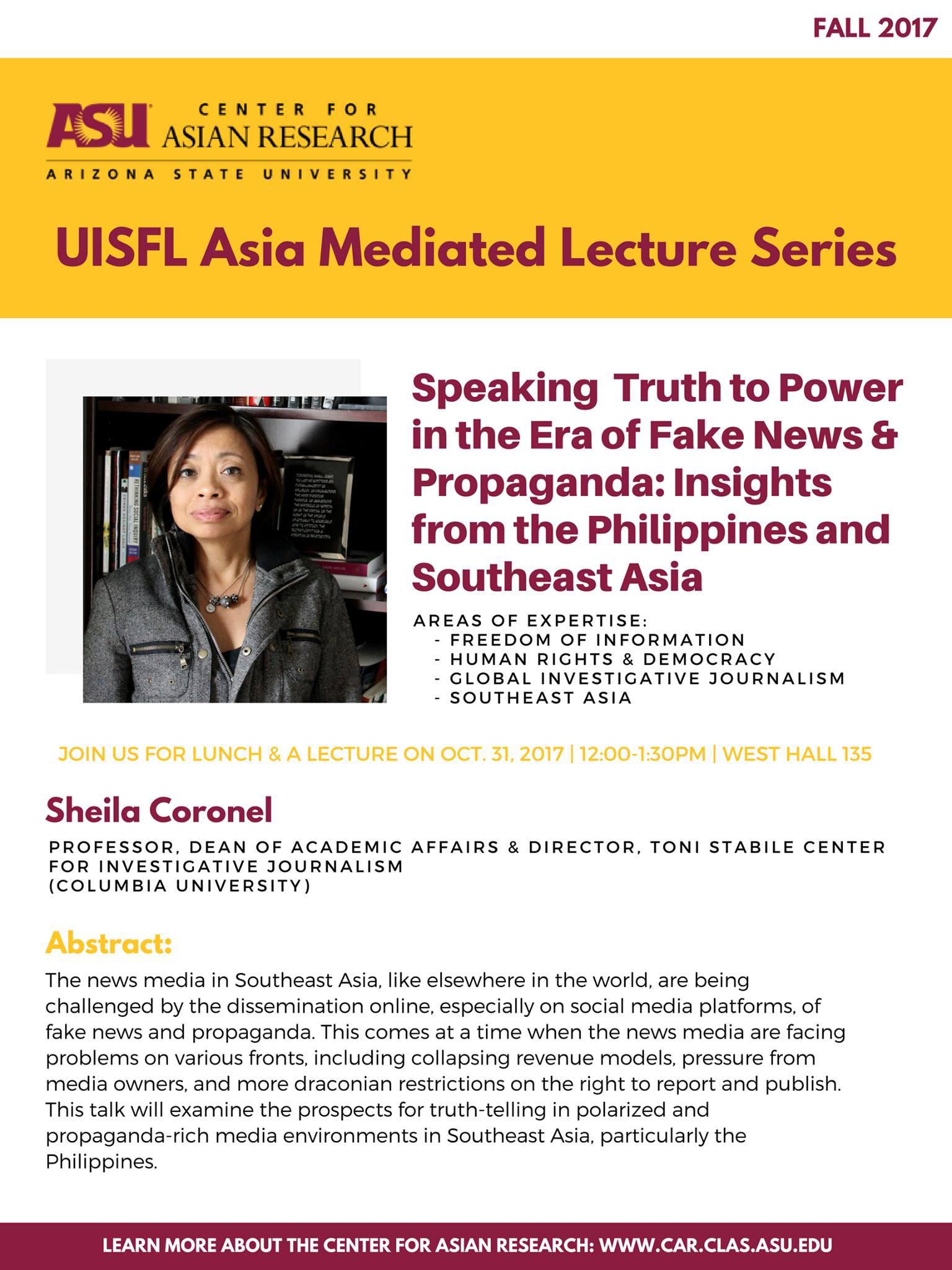
USIFL Asia Mediated Lecture Series
The Social Mediascape of Transnational Korean Popular Culture: K-Pop, Digital Games & Animation
by Dal Yong Jin, Distinguished SFU Professor, School of Communication, Simon Fraser University
The New Korean Wave, referring to the rapid growth of local popular culture and its global penetration, starting in the late 2000s appears to be more intensive in its popularity. The new Korean Wave means the circulation of local popular culture, not only on television programs and films, but also K-pop and digital games, as well as animation, with the help of social media.The social media-driven new Korean Wave has aptly adjusted to global fans’tastes in both production and consumption as Korean cultural producers have developed their popular culture in tandem with the developments of social media. This presentation examined the dynamics of globalization and transnationalism, particularly the ways in which the Hallyu phenomenon is integrated into a social media-embedded cultural landscape in North America. The talk will also mapped out why social media has contributed to the enhanced popularity of the transnational media culture produced in non-Western regions, including Asian contexts.
A.T. Steele Lecture
Local Performances as Dakwah: Islamization of Java, Javanization of Islam
by Peter Suwarno, Professor of Indonesian Language, SILC, ASU
November 16, 2017
In November 2017, Dr. Peter Suwarno delivered an A.T. Steele Lecture focusing on the traditional Javanese shadow puppet shows. He discussed how local preachers exploit local performances for dakwah and how local traditional performers incorporate and adapt to Islamic discourses, symbols, and rituals in their works.
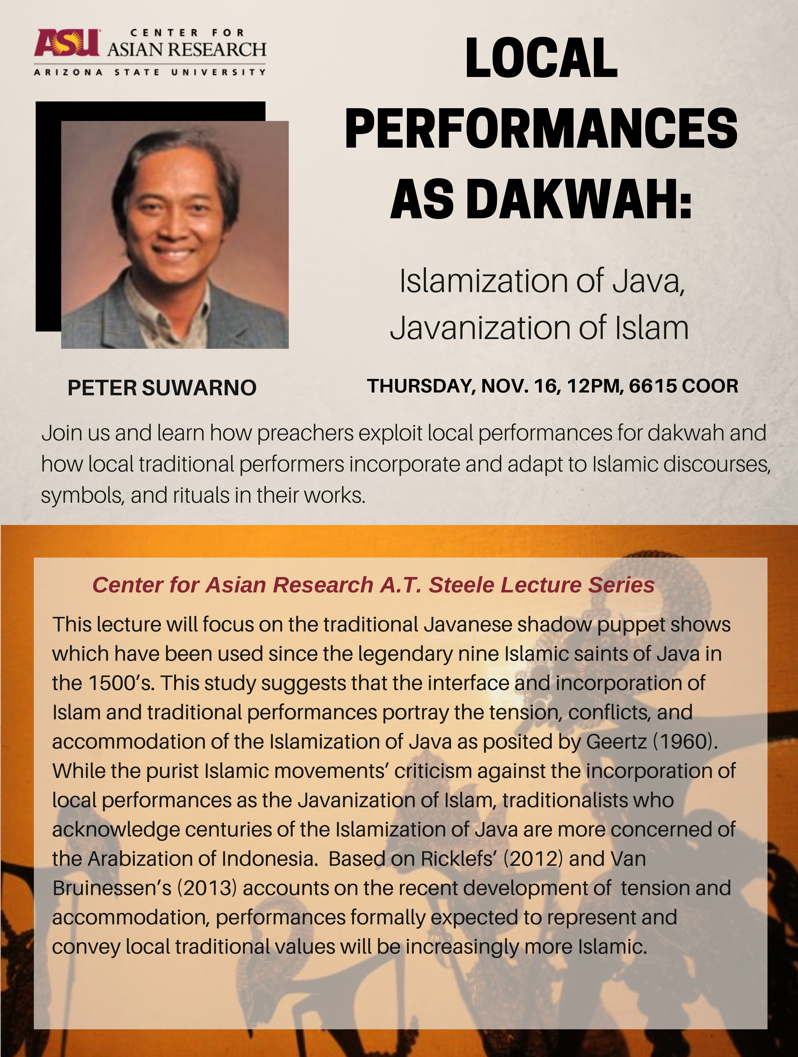
Spring 2017
USIFL Asia Mediated Lecture Series
Vulnerable victims or Empowered Agents? Performance, Digital Media, and Migrant Women in Beijing
by Cara Wallis, Associate Professor, Department of Communication, Texas A&M University
April 21, 2017
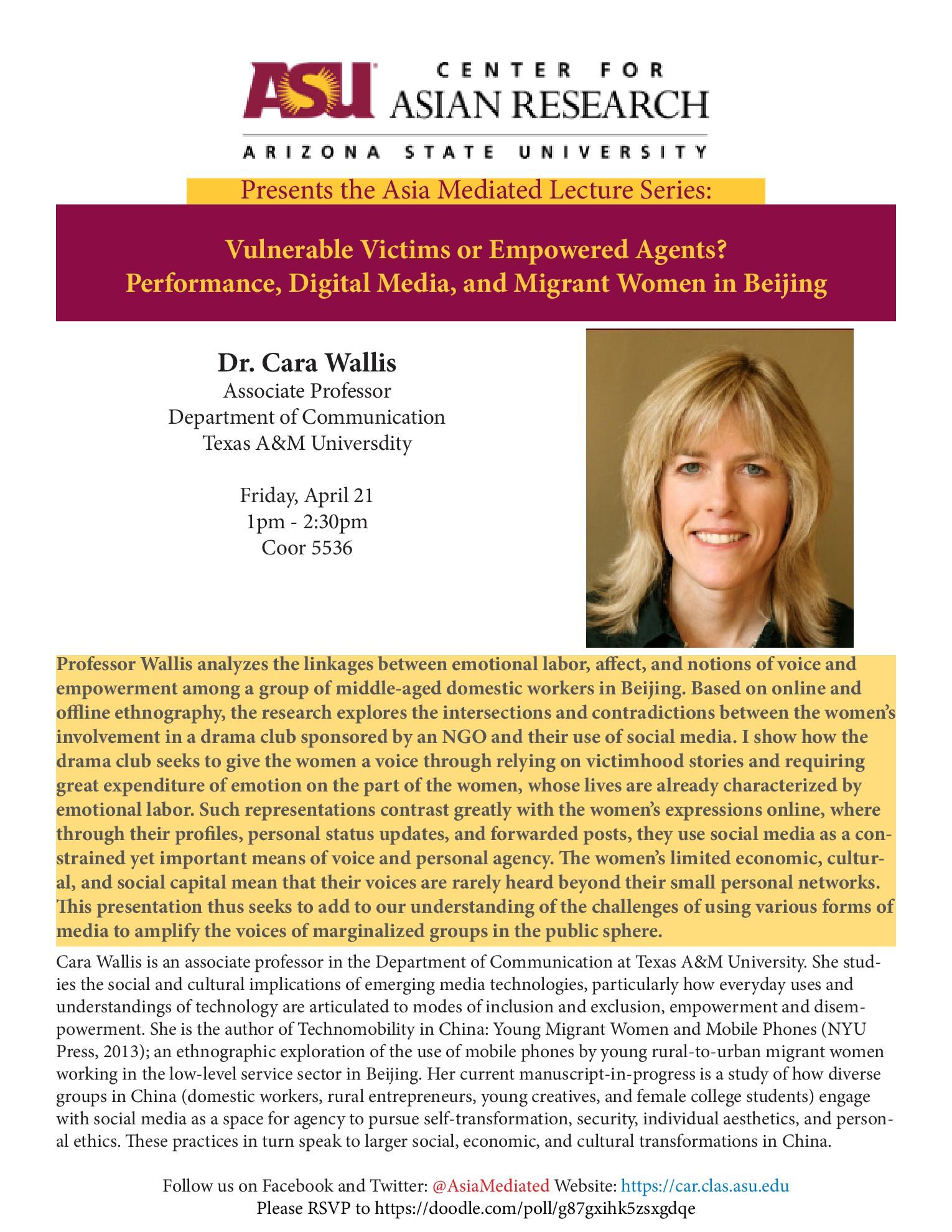
USIFL Asia Mediated Lecture Series
Facebook for Hotshots: Social Media and Transition in Myanmar
by Lisa Brooten, Associate Professor, Department of Radio, Television, and Digital Media, Southern Illinois University-Carbondale
March 31, 2017
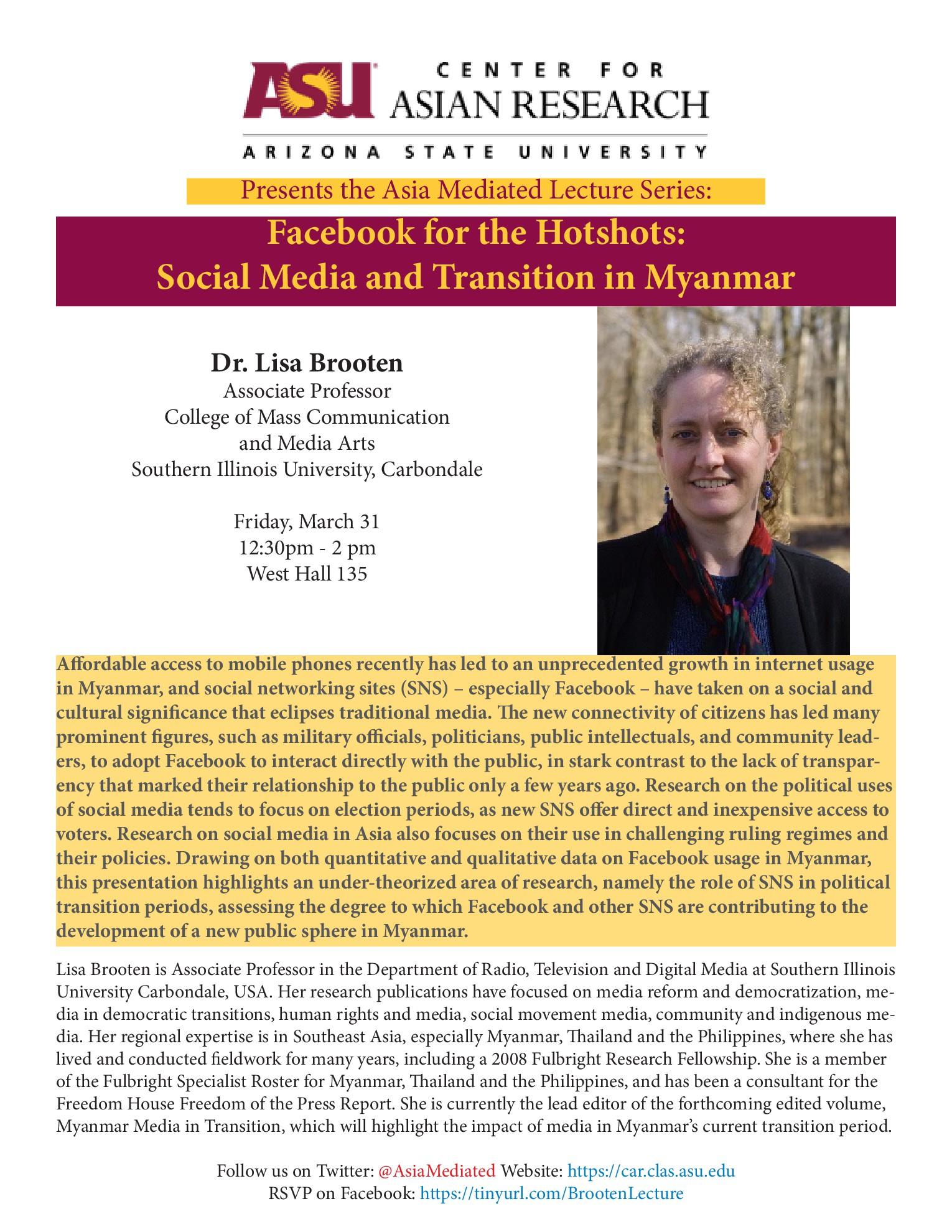
USIFL Asia Mediated Lecture Series
Big Data in China: Big Dreams- and Big Brother
by Wenhong Chen, Associate Professor, Department of Radio-TV-Film and the Department of Sociology, University of Texas-Austin
February 24, 2017
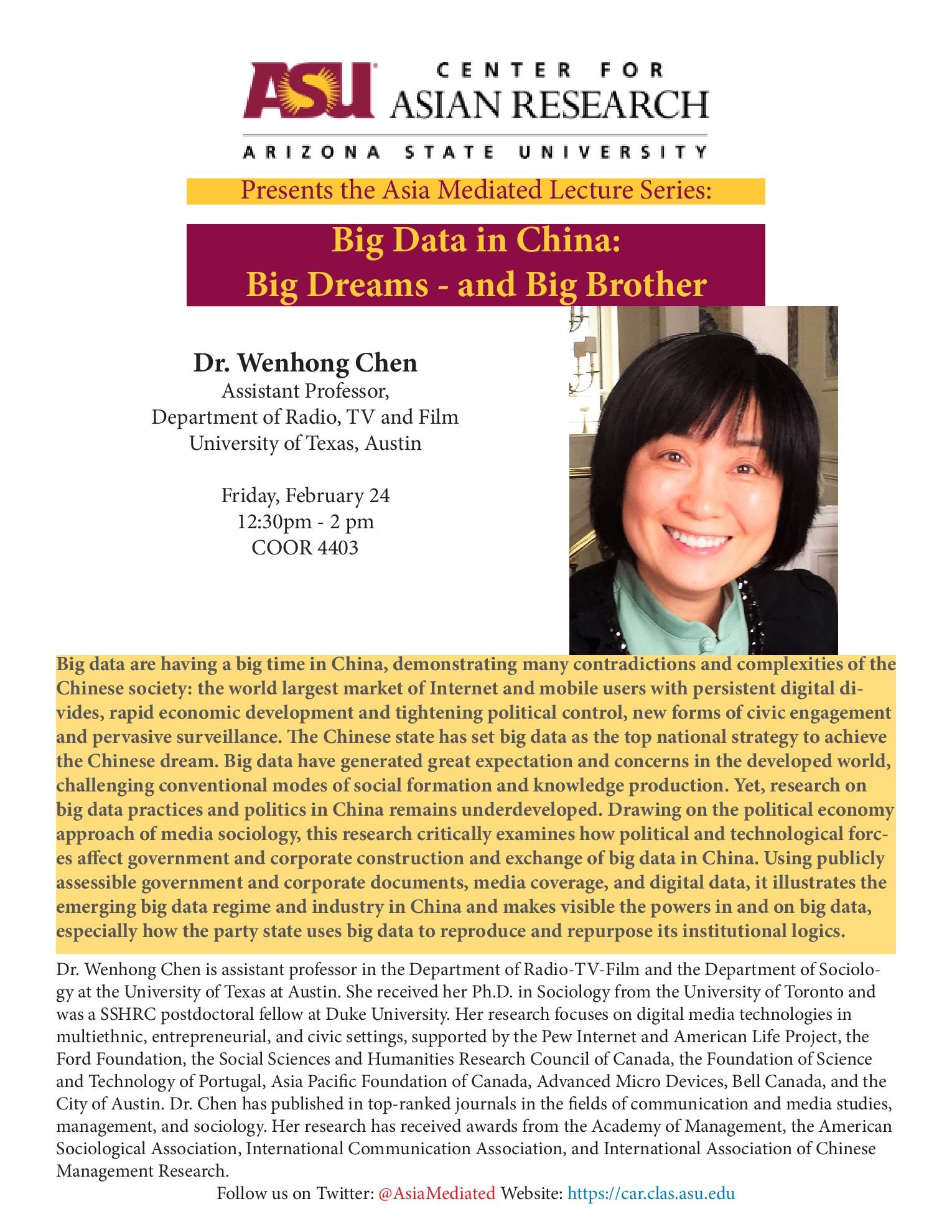
Fall 2016
The "Civilizational Dynamics and Practices of Self Lecture" Series
Civilizational History: From Acculturation to Regimes of Truth
by Steven collins, Professor, Robert H.N. Ho Family Foundation, Distinguished Visiting Professor of Buddhist Studies, ASU; Chester D. Tripp Professor in the Humanities, University of Chicago
August 31, 2016
Premodern modes of power, each with its own elite, existed in a changing dynamic of antagonistic symbiosis. How and where in this can we place askesis, Practices of Self and Regimens of Truth?
Professor Collins’ lecture can be seen accessed here: https://vimeo.com/181113727
The "Civilizational Dynamics and Practices of Self" Lecture
“The Sociology of Wisdom: Supererogation in Morality and Society”
by Steven collins, Professor, Robert H.N. Ho Family Foundation, Distinguished Visiting Professor of Buddhist Studies, ASU; Chester D. Tripp Professor in the Humanities, University of Chicago
September 7, 2016
Wisdom in Buddhism is more than just a word for Enlightenment. We need a wider comparative study of wisdom Literature. Supererogation — going beyond the call of duty — can be used as a sociological as well as moral concept.
Professor Collins’ lecture can be seen accessed here or below: https://vimeo.com/182161650
The "Civilizational Dynamics and Practices of Self" Lecture
“Buddhist Practices of Self: Historical and Philosophical Contexts”
by Steven collins, Professor, Robert H.N. Ho Family Foundation, Distinguished Visiting Professor of Buddhist Studies, ASU; Chester D. Tripp Professor in the Humanities, University of Chicago
September 21, 2016
How and Why did Buddhist and other forms of asceticism arise in the Second Urbanization of India (6th to 4th centuries BCE)? One needs to understand Buddhism’s dichotomy between Conventional and Ultimate Truth to be able to make comparative analyses.
Professor Collins’ lecture can be seen accessed here or below: https://vimeo.com/183895832
The "Civilizational Dynamics and Practices of Self" Lecture
“Buddhist Practices of Self: Spiritual Exercises”
by by Steven collins, Professor, Robert H.N. Ho Family Foundation, Distinguished Visiting Professor of Buddhist Studies, ASU; Chester D. Tripp Professor in the Humanities, University of Chicago
September 28, 2016
To understand forms of askesis, Practices of Self, we need to look from both internal and external pespectives. That is, there are forms of dress (uniforms) as well as of ‘introspection.’ The lectures will conclude with a brief history of the rise of Insight meditation (vipassana) and Mindfulness (sati), in Buddhism and in contemporary psychotherapy.
Professor Collins’ lecture can be seen accessed here or below: https://video.ibm.com/recorded/91801762
Spring 2016
A.T. Steele Lecture
Understanding Tourist’s Involvement with Pop Culture: A Case of Korean Pop Culture
by Woojin Lee, Associate Professor, School of Community Resources and Development, ASU
March 28, 2016
While the power of pop culture has increased tourism demand in showcased destinations, there has been little empirical research investigating tourists’ involvement with pop culture. Based on a survey of Chinese tourists who visit South Korea, this research seeks to identify four different levels of involvement tourist groups. More specifically, adapting the conceptual framework of Psychological Continuum Model (PCM), the research investigates the linkage between tourists’ involvement with pop culture and general outcomes of tourism experiences. The findings suggest that tourists have different levels of involvement with Korean pop culture: awareness, attraction, attachment and allegiance, and the four groups have different characteristics in terms of demographics, visit purpose, tourists’ fulfillment (utilitarian and hedonic value), attitude toward visiting of Korea and revisit intention to Korea.
A.T. Steele Lecture
The Myanmar Librarian Training Consortium
by Ralph Gabbard, Librarian, ASU
April 12, 2016
The Myanmar Librarian Training Consortium (ASU Libraries, University of Washington Libraries and Northern Illinois Library) announced that the consortium has been awarded a grant for librarian training for two years (2016-2017). According to Dr. Ralph Gabbard, one of the principal investigators, ASU Libraries will take the lead on preservation and conservation part of the grant while University of Washington Libraries will lead on Subject Librarianship and Northern Illinois University Library on digitization issues. Beginning in 2016, the consortium will offer three in country workshops, ASU Libraries will organize a preservation and conservation workshop. Each consortium library will host two of the six librarians at their institutions while the seventh librarian will be a preservation and conservation intern at ASU Libraries. This award was built on the success of the pilot program held by the consortium members in 2013 and it is hope that we will be able to extend this program beyond 2017.

Graduate Forum on Asia
The South China Sea Disputes: Phenomena and Essence
by Qiang Cao, Visiting Scholar, School of Politics and Global Studies, ASU
April 19th, 2016
Over the past few years, the South China Sea (SCS) disputes have become a hotspot and dominated the headlines of newspapers. Actually, in Asia, there are plenty of territorial disputes. However, among these disputes, the SCS disputes are quite special and more complicated. First of all, the disputes, involving China (Mainland and Taiwan) and five countries in Southeast Asia (Vietnam, Philippines, Malaysia, Brunei and Indonesia), are not bilateral but multilateral. Not only China and Southeast Asian countries have controversies, but also among the ASEAN countries themselves they have different claims. Secondly, the disputed waters are not an isolated area. Conversely, the SCS is one of the world’s most important sea lanes, both for civilian and military vessels. This means the potential conflicts in this area will definitely affect the international waterways and global shipping. Last but not least, the disputes will also affect the geopolitical security in this area. The out-of-control of SCS disputes may cause regional arms race and even military collisions, which may eventually break and reconstruct the current existing global order founded and led by US. So in this sense, similar to the crisis in Russia after the invasion of Ukraine, the SCS disputes can be seen as a challenge from an emerging power (China) against the existing international order. Meanwhile, from the historical perspective, the SCS disputes also can be seen as a challenge from China as a traditional land power against US as a great sea power. In the history of human beings, this is not rare. From Carthage vs Rome to Napoleon’s France vs Great Britain, this kind of collision is almost an eternal subject of human history and to some extent, inevitable.
